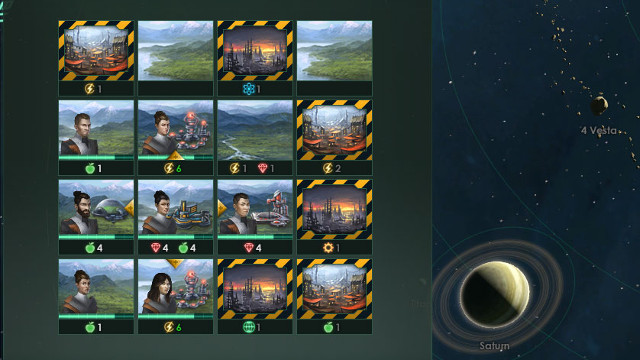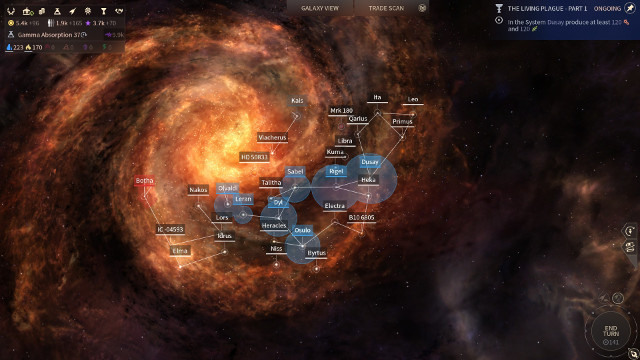It's been about a year since Stellaris first released, a space 4X game that has you research new technology, explore a vast galaxy, encounter other empires, gather resources to improve your tech and army, and eventually parlay all of that into a declaration of victory. And now, we're finally about to get our first piece of Endless Space 2, a space 4X game that has you research new technology, explore a vast galaxy, encounter other empires, gather resources to improve your teach and army, and eventually parlay all that into a declaration of victory.
Each game has Random Events, that can be queued by goings on in the galaxy or by investigating a planet you find, and you balance a complex economy of strategic and luxury resources that you can sell or trade to other empires. Actually, it might just be easier to explain how they aren't the same … hey, that gives me an idea!
In all seriousness, though, despite the genre and space setting, these are vastly different games. They're similar in the same way Dota 2 and League of Legends are similar: anyone who hasn't played either game will think they're the same, but anyone who's played either know they're way different. While we won't have our review up until next week (embargos and whatnot), after several hours of playing, we can tell you what to expect when you're expecting Stellaris. Here are the biggest differences between Endless Space 2 and Stellaris.
It's Turn Based
This is perhaps the biggest change you'll immediately notice. Unlike Stellaris, which plays out in real-time, Endless Space 2 is turn-based. This is similar to its counterparts in the Amplitude Studios' "Endless" series, which includes Endless Legend, and the original Endless Space. In fact, it may just be easiest to think of Endless Space as Endless Legend in space.
These turns are simultaneous, so there isn't too much undue waiting. Everyone plays at the same time, and a new turn starts once the last person clicks the "End Turn" button. Endless Space 2 has custom settings for multiplayer that can set a time-limit for turns that increases as their empire increases. You can even set an "overtime" bank for people who extend past that time limit.
This means that you have ample time to respond to certain timed quests that pop up. On the other hand, if another empire catches you unprepared, it can be a long time before you're able to respond to that threat.
Traditional End-Game Goals

As much as I loved Stellaris, I've long noted how it feels more like a space simulator, thinking of it more like Galaxies XL than Civilization: Space, if that makes sense. This is in part because it has so few victory conditions that take so long to accomplish that it can really just feel as though you're managing an ever-growing empire rather than actually working toward something.
In Stellaris, you either have to control 40% of the Galaxy's habitable worlds or subjugate every other empire in order to claim victory. In Endless Space 2, Amplitude takes a more traditional approach, having victory conditions for Score, Supremacy, Economy, Science, Conquest and Wonder, with each of them having different contributing factors and an ultimate end goal.
Granted, this doesn't mean the game is short. Unless you set a shorter game in terms of turn-count and beeline the score victory, you can still sink double digit hours into one playthrough of Endless Space 2, but, contrary to its name, it's not as endless as Stellaris.
No Surface-Level Micromanagement

In Stellaris, colonizing planets comes with a surface-level management mechanic, requiring you to build different buildings to produce resources on each planet you colonize. Not so, in Endless Space 2. Amplitude streamlined the system management portion.
Instead of constructing buildings (called "improvements" in Endless Space 2) on the planet, Endless Space 2 will have you construct these buildings by the system. So, if there are three planets in one system, each building you create will provide those bonuses for all three of those planets. Boiled down, the two systems are very similar, but they will feel a lot different, as it's a bit less complex in Endless Space 2.
This also means that ships and system improvements are created from the same mechanism. In Stellaris, you would build buildings on the surface and ships with the Spaceport. In Endless Space 2, you'll have to build them all through one mechanism, which means you can't build ships and improvements at the same time from the same system.
Varying Political System

Assuming of course you're in some sort of democratic government, Endless Space 2 takes a similar approach to alignment as a game like Torment: Tides of Numenera. Rather than simply picking what you are and having that decide what you can and cannot do, ala Stellaris, Endless Space 2 has you pick what you do and uses that to determine what you are.
Endless Space 2 has various factions of government, ranging from Militarists, Pacifists, Ecologists, Religious(ists?), Scientists all the way to Industrialists. Each action you take in random events, each improvement you build, essentially every choice you make emboldens one faction over another. You might choose to try a citizen in your empire for treason, and this will boost the Militarist faction, which will then grow more support and eventually usurp power at your next election.
Once they have power, one law specific to that faction will be automatically put in place, and you'll have access to a whole host of others. It's a fluid system that will change, and whatever party is in power can alter vastly the makeup of your empire and economy.











